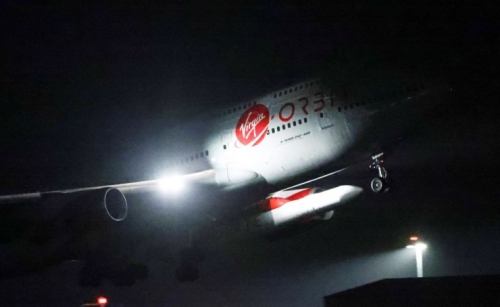Britain's groundbreaking satellite launch ends in failure
Agencies | London
The Daily Tribune – www.newsofbahrain.com
Britain's attempt to become the first European nation to launch satellites into space ended in bitter disappointment early on Tuesday when Virgin Orbit said its rocket had suffered an anomaly that prevented it from reaching orbit.
The "horizontal launch" mission had left from the coastal town of Newquay in southwest England, with Virgin's LauncherOne rocket carried under the wing of a modified Boeing 747 called "Cosmic Girl", and later released over the Atlantic Ocean, Reuters reported.
"We appear to have an anomaly that has prevented us from reaching orbit," the company said. "We are evaluating the information."
The failure deals a further blow to European space ambitions after an Italian-built Vega-C rocket mission failed after lift-off from French Guiana in late December.
The rockets have since been grounded.
Europe has suffered a series of setbacks in the past year, with its key Virgin Orbit had initially said on Twitter that LauncherOne had reached earth orbit, a tweet it later deleted.
"Over the coming days there will be an investigation by the government and various bodies, including Virgin Orbit," Matt Archer, Commercial Space Director at the UK Space Agency said.
Virgin Orbit (VORB.O), part-owned by British billionaire Richard Branson, had planned to deploy nine small satellites into lower Earth orbit (LEO) in its first mission outside its United States base.
The mission had been heralded as a historic first for Cornwall, Britain and Europe, and thousands of enthusiasts watching from beside the runway cheered when "Cosmic Girl" took off and when they were told the rocket had been deployed.
The crowd quickly and quietly dispersed following the announcement of failure.
A mission failure would be the second in Virgin Orbit's history since its first launch in 2020. The company has had four successful missions.
Archer, at the UK Space Agency, said the a first stage burn had taken the rocket into space but the second stage had a "technical anomaly and didn't reach the required orbit".
A graphic display on an official video feed showed the mission at second-engine cut-off, three steps short of payload deployment about two hours after take-off.
Related Posts

